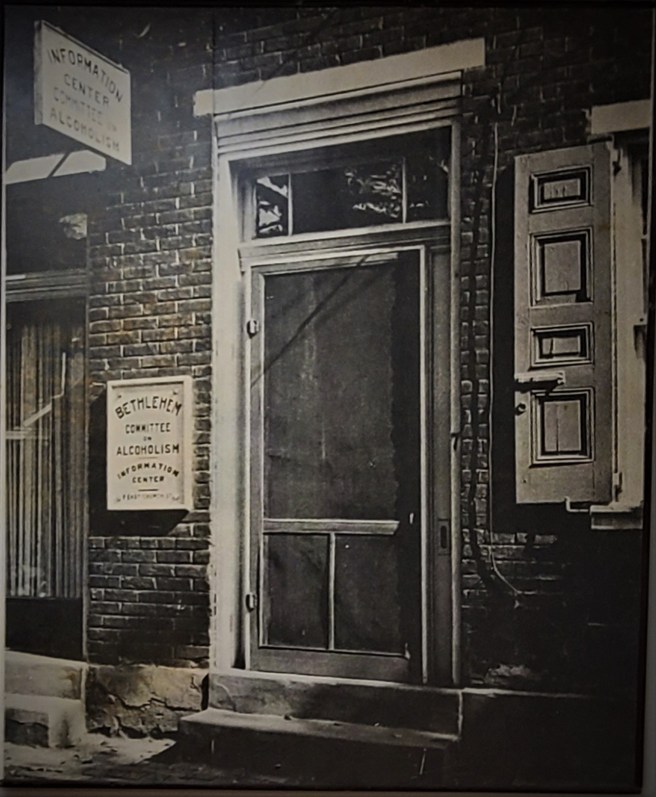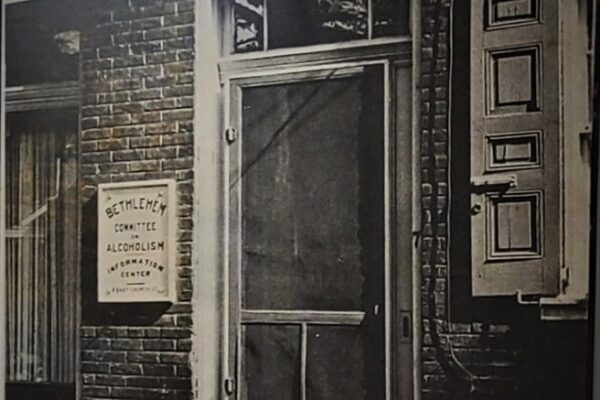
Those who cannot remember the past are condemned to repeat it.” – George Santayana
The other day I was on a zoom call and I could see a poster of local recovery history behind one of the persons I was talking to. I asked about it, and he told me he had stumbled on the poster when a local agency was cleaning out a condemned building. They were going to throw it out. He salvaged it for a local recovery community center because he was in the right place at the right time. I gave him a brief history of what I recalled about the place and the historical significance it held. It was one of the first alcoholism councils in the nation, the Bethlehem Council on Alcoholism. It was started in in 1950 and was renamed before being disbanded in the 1990s. As I got into recovery in the mid-1980s, I knew people who had worked there and how it related to a lot of the local service system.
They were our local pioneers, and it linked back to 1944 and Marty Mann and National Committee for Education on Alcoholism. The very notion that Alcoholism was a disease, and to educate the public on the fact that alcoholism is not a moral failing was a radical concept. I thought back to some of the people I had the opportunity to meet in my early recovery and their significant life contributions to these early efforts. I got help through one of the organizations that came out of this era and later ran it. Their efforts before I was born helped save my life. They developed services for “our people” because no one else cared, a theme that repeats through history as Bill White wrote about.
So what are we doing to lift young leaders onto our own shoulders? What will they know about how we got here or how to use that knowledge to make educated decisions about where to go next?
We have done a very poor job of transferring our own history on any level, local, state or nationally. We do not transfer knowledge about what we have learned along the way in any organized fashion. As a system, we do next to nothing to groom young leaders with heart for the work to carry the mission forward. We do almost no succession planning. We do not groom younger leaders into roles in which they learn in depth about our systems, our history and our successes and failures. We fail to understand that people with lived recovery experience are the backbone of our care system and we must include them as vital to preparing for future needs.
Forgetting our past and failing to prepare for our future.
Teaching about our collective failures could well save a lot of future pain and suffering so they learn from our mistakes without having to repeat them. Without the life work of Bill White, we would not even have a place to look to go to and examine our history and benefit from the wisdom of the people who have forged ahead of us. His interviews, monographs and papers provide context and insights that would otherwise be lost history. The truth however is that most of our young leaders do not even know of his work or the historic struggles they overcame to realize even the limited successes we see in front of us today.
And now we face an ever-deepening workforce crisis in the SUD care system. We know it is there, SAMSHA recently completed a report showing we need major recruitment across all Behavioral Health Sectors just to stay even with pre-COVID care demand. A decade ago, our annual workforce turnover rate was between 19% and 50%. Since then, annual total US workforce turnover has increased 88%. This Behavioral health study, published in 2020 suggested a 45% annual turnover rate based on its sample. HRSA is going to be doing an additional study.
We are collectively failing in recruitment, retention, and succession planning. Even as treatment and recovery services have never been more needed and institutional knowledge is walking out of doors across our care system.
We are failing in our field stewardship responsibilities to mentor and develop new recovery leaders. Well respected, and deeply contributive organizations whither and fail when new leaders were not properly groomed and steeped in our history or trained to understand the nuances of the work. They do not know what they do not know. A form of Institutional amnesia. According to this article, less than half of our Behavioral Health Organizations have any kind of succession planning in place. That we fail to try to develop new leaders to understand the challenges we faced, and the value of historic knowledge is nothing short of a crime.
Most of the perennial studies I have seen over the last few decades raise remarkably similar points about the barriers. It is time to move to solutions. Perhaps we can move more resources into workforce retention and leadership development. We can start with the recognition that people in recovery are the foundation of the SUD workforce. We can build recovery capital by investing in leadership programs that mentor new recovery leaders in every state across the nation. If we do this, we will invest in those with heart, those who stick and stay across an entire career.
Some questions to consider:
- What is the history that led to your local organization being founded?
- What were the visions and motivating elements that drove your historic leaders to do what they did?
- Did those pioneers make mistakes we can learn from so we can avoid repeating them?
- How does your organization groom potential leaders to understand and build upon foundational work?
- Is your organizational history even written down – are people aware of their own organizational history?
- How can new leaders effectively navigate organizational, and systems change challenges without knowledge of where the hidden reefs and sandbars are?
- What resources do we devote nationally or at the state level for workforce succession and leadership development?
- Why do we not invest in field leadership development?
- Are we always in such a perpetual crisis that we continually postpone forward focus on succession planning?
- If you run an organization, what would happen if you got hit by a bus tomorrow?
In short, our entire substance use care workforce dynamic can be summed up under the perspective that our futures are inseparably entwined, and we are not investing in it in meaningful ways. We will sink or swim together and unless we put a lot more effort in, my sense is we shall sink. Our future is a collectively bound. We fail when we forget the past and do little to prepare for the future. Let’s do the former rather than the latter.
If there is anything more important that preparing our to sustaining efforts to expand recovery than steeping new leaders in our history and helping them prepare for our future, I do not know what it is.
What is needed:
- Recovery leadership academies in every state, run by and for the recovery community to ensure that the work of recovery strengthens community recovery capital.
- A focus on understanding that people with lived experience are most likely to be retained over the long term so they are the vital element to prepare for the future.
- Recovery oriented mentorship processes that build resources within regional communities
- Recovery oriented mentoring processes that develop new leaders that emphasize our shared history and developing skill sets to prepare for future challenges.
- Strengthening of career ladders that identifies younger talent and provide the means for coordinated development.
- Efforts to remove barriers to employment, such as historic legal histories that can prevent people from getting into the workforce and obtaining employment, even many decades after they are in recovery.
If any readers in policy positions who want to focus work on this issue or get some of us formerly young leaders who still have heart for the work to put effort here, please count me in. It is one of the things I wish to devote my remaining time on. I want to be part of the solution.
I owe it to those whose shoulders I am perched on, I suspect I am not alone.
The best time to do this was twenty years ago, the second-best time is right now.
Additional Reading links:
Leadership in Addiction Treatment: The Coming Crisis – William L. White (2002) – Link HERE
Calling a New Generation of Leaders – William L. White and Lonnetta Albright (2006) – Link HERE
Staff Turnover in Addiction Treatment: Toward Science-Based Answers to Critical Questions – William L. White, MA and Bryan R. Garner, PhD (2011) – Link HERE
